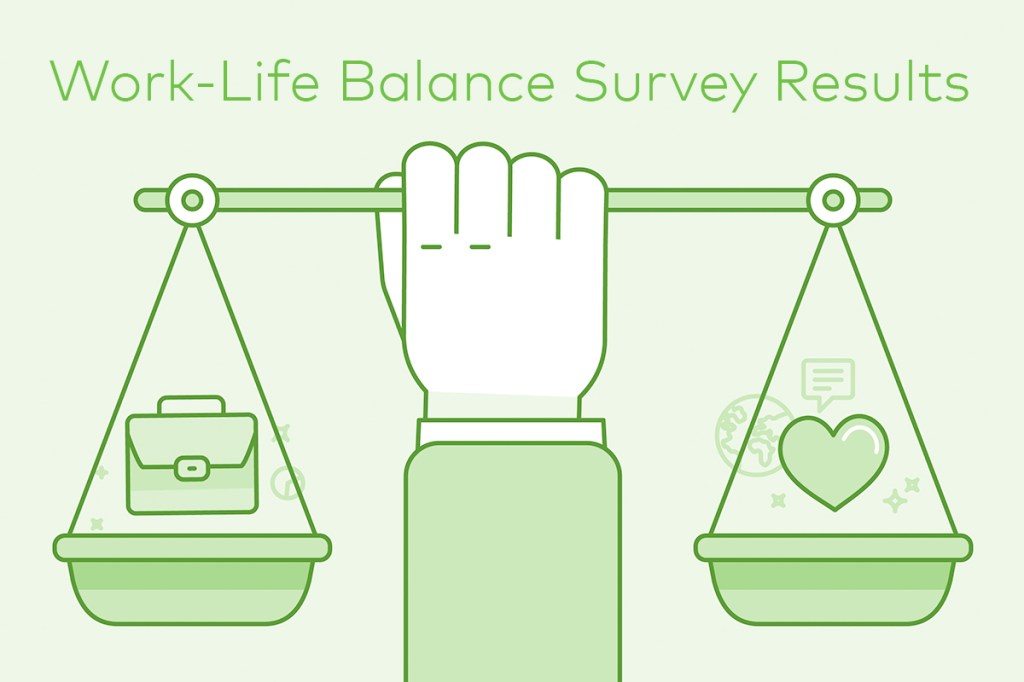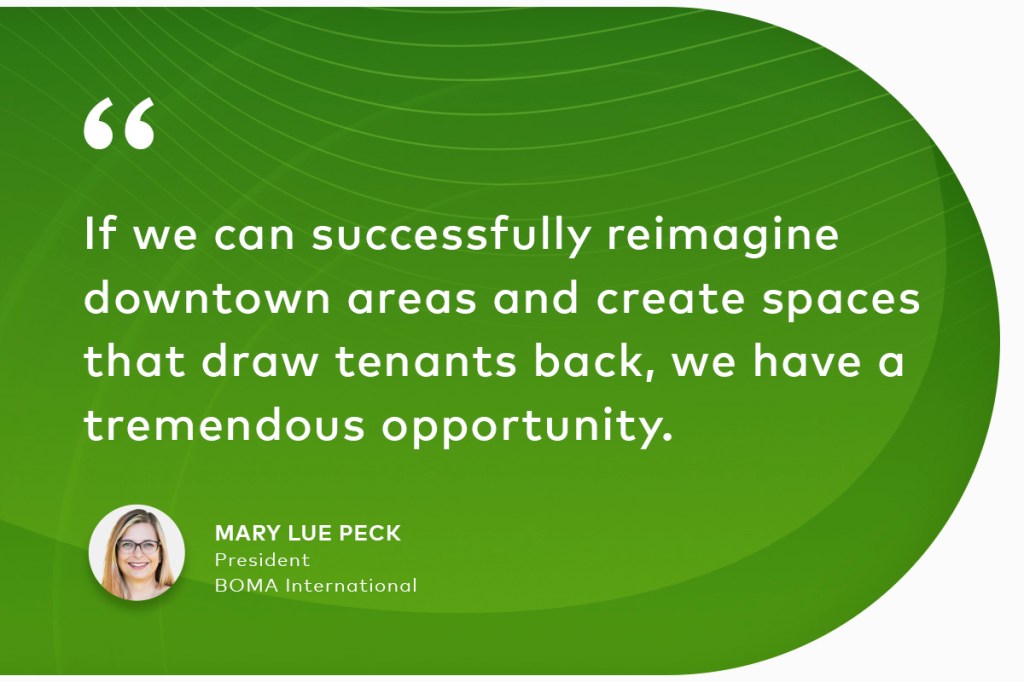For more about how property managers can reach different generations (including how to help with their work-life balance), check out:
- 5 Rental Perks That Will Attract Millennials & Baby Boomers
- 4 Must-Know Ways Gen Z Renters Are Affecting Property Management Now
There’s no denying that striving for a balance between work and your personal life is essential to maintaining a healthy life. Granted, many aspects can contribute to a perceived work/life balance, from the type of work and hours to stress levels and even sleep quality.

Key Takeaways
- Gen Z is the most likely to work on-site, while nearly half of millennials, Gen X and baby boomers are still working from home.
- The older generational cohorts tend to be happier with their work/life balance, with 77% of baby boomers happy compared to 50% of Gen Z.
- Regardless of age, the majority of respondents perceive the ability to work from home as beneficial to the balance between their professional and personal lives.
- Only 10% of respondents said workplace stress did not affect their personal life. The most popular de-stressors include watching TV and spending time with family.
- Baby boomers and millennials are more willing to trade pay for schedule flexibility, while Gen X and Gen Z is less willing to do so.
Where Americans stand
To find out where Americans of all ages stood on their work/life balance, we conducted a nationwide survey. Specifically, we asked 2,006 respondents questions about their work status, perceived stress levels, and other work and lifestyle details.
As our previous work/life balance survey outlined, the pandemic had a considerable effect on transforming how we work. Notably, more than two years since the pandemic was first declared, 46% of respondents are still working from home, with Gen X being most likely to telecommute (49%), and Gen Z being the least likely (41%). Hybrid work models were also represented, with approximately 17% of respondents alternating between working remotely and on-site.
On the other hand, as many as 45% of Gen Z who responded to our survey said they worked from the office — a considerably larger percentage than any other cohort. Then again, Gen Z is also more likely to hold entry-level jobs that require either more hands-on training or physical presence.
Millennials & Gen X find it more difficult to separate home & work life
Generally, the older the respondent, the more content they were with their work/life balance. For example, while half of Gen Zers were satisfied with the separation between their work and personal life, more than three-quarters of baby boomers were happy in this regard. At the same time, just one-quarter of Gen Z said they were unhappy with their work/life balance, with smaller shares of the older generations answering similarly.
One evolution worth noting is the fact that, according to our previous study, only 45% of Gen Z was satisfied with how they juggled home and office life. Essentially, older Zoomers may have become more accustomed to their role or company or have otherwise learned how to balance work and home life more efficiently.
Meanwhile, fewer millennials and Gen Xers — 61% and 63%, respectively, compared to 73% and 68% last year — were happy about their work/life balance. However, their perception could be affected by a variety of factors, such as economic conditions and shifting regulations with childcare and schools.
Americans of all ages split on how pandemic affected work-life balance
Notably, as the adoption of remote and hybrid models transforms work, the balance between our professional and personal lives is also undergoing changes.
For instance, when asked how their work/life balance had changed since the pandemic began, 41% of Gen Z said that it had gotten worse, while 35% said it had gotten better and the rest reported no change at all. Of course, a significant number of Zoomers just got their first job in the past few years, which may have influenced their perception of the recent changes to their work/life balance.
On the opposite end of the spectrum, only 17% of baby boomers felt that the pandemic and the subsequent changes it brought negatively affected their work/life balance, while 46% of the cohort felt an improvement in that regard. The remainder perceived no changes.
Finally, the age groups situated in the middle were split when it came to the recent evolution of their work/life balance: While only 22% of millennials surveyed last year felt as though their work/life balance had deteriorated during the pandemic, that figure climbed to 34% this year. Similarly, the proportion of Gen X that was negatively affected grew from 24% in 2021 to 31% in 2022 — indicating that the pandemic may have negatively affected the lives of middle-aged workers in other ways.
Remote work benefits work-life balance of all generations
While opinions were split on the overall effect of the pandemic on the balance between work and play, one aspect that all cohorts agreed on was the benefit of remote work. Of those we surveyed, 77% of Gen X and 72% of millennials said that the ability to telecommute helped their work/life balance at least to some degree. Meanwhile, 11% of Gen Z and 13% of baby boomers reported that remote work had not helped their work/life balance in any way.
More flexibility vs. higher pay
Baby boomers and millennials are the most willing to trade pay for flexibility in terms of schedule, whereas Gen Z — a generation currently making its way into the job market or working entry-level jobs — are the least willing to make that trade.
In fact, among respondents employed full-time, Gen Z reported the second-highest number of work hours per week, on average (44.5 hours), following only baby boomers (44.8 hours). Millennials had the lowest average (43.9 hours). To that end, younger people trying to save money or older workers nearing retirement may be more focused on maximizing their earnings, while middle-aged workers may be more willing to make compromises in the workplace in exchange for more breathing room in their personal lives.
Based on our survey, if they had more time off, most Americans would devote it to their families or personal interests. In fact, 23% of all respondents would spend any extra free time with their family, while 20% would devote more attention to a hobby.
The next most popular choices were traveling or developing new skills, with approximately 17% of respondents choosing these options. In last year’s survey, pursuing hobbies was the most popular choice, by far (29%), while spending time with one’s family came in second. Clearly, the pandemic seems to have shifted our priorities for free time allocation, making time spent with loved ones more important than before.
Baby boomers least-stressed generation
This year’s survey also revealed that workplace stress tends to affect the younger generations to a greater extent. For example, 19% of Zoomers, 14% of millennials and 13% of Gen X said their workplace stressed them a lot, whereas only 9% of baby boomers answered the same.
However, stress levels were perceived as higher across the board, with 41% of all respondents reporting “some” workplace stress, compared to approximately 36% of last year’s respondents. Conversely, only 10% of this year’s survey respondents said that stress from their profession does not affect their personal life in any way, versus 13% of respondents last year.
What’s more, the hustle and bustle of modern life that leads to chronic stress is also evidenced by the amount of time that Americans dedicate to lunch: Less than one-third of respondents said they take between 30 and 60 minutes for lunch, while almost half said they have 15 to 30 minutes for their lunch break and 17% reported having less than 15 minutes to eat their lunch.
Consequently, while work/life balance improved for many people due to telecommuting, other workplace conditions may shift the balance in the opposite direction (which may also explain the general increase in perceived stress levels).
TV is most popular de-stressor
In terms of de-stressing, watching favorite TV shows — whether on cable or Netflix — is still America’s go-to pastime, with between 17% and 18% of respondents across all four generations choosing this as their preferred method to relax. Otherwise, Gen Z and millennials gravitated toward engaging in social media and spending time with their family as their next-favorite activities for dealing with stress, while Gen X and baby boomers preferred family time and going on walks. Reading also made an appearance as the fourth-most popular activity for Gen X and baby boomers.
Are we losing sleep?
Lack of sleep may be one reason younger generations feel like their work/life balance is suffering. Just over half of Gen X surveyed said they got seven or more hours of sleep per night — the amount recommended by doctors for a balanced life. They were joined by 58% of millennials and 63% of Gen Z. Even so, around 40% of millennials and Gen X, as well as more than half of Gen Z, said they still felt tired when they woke up.
This represents a considerable drop in sleep hours compared to our previous survey, in which a higher percentage of Gen Z, millennials and Gen X said they got seven or more hours of sleep per night. Not getting enough sleep is one of the main enablers of workplace stress and can negatively affect energy levels and moods in the long term.
Among all of our respondents, 53% said they worked full-time, while 22% said they were currently freelancing and 22% were working part-time. Baby boomers were the most likely to hold a full-time job, while part-time work was (unsurprisingly) the most popular with Gen Z.
Finally, freelancing is currently the most popular with millennials and Gen X (25% and 26%, respectively). In addition to bringing the wide adoption of working from home, the pandemic also seems to have increased the popularity of freelancing, thereby allowing for more flexibility, which middle-aged respondents value.
Methodology
Our survey included 2,006 respondents, 25% of which were Gen Z; 26% millennials; 26% Gen X; and 23% baby boomers. All respondents were older than 18. Age groups were defined as follows:
Generation Z: Less than 25 years old
Millennials: 25 to 40 years old
Generation X: 41 to 55 years old
Baby boomers: 56 years old and older
Survey responses were collected using Clickworker and Amazon Mechanical Turk. The survey has a 5% margin of error and a 95% confidence level.
This article was originally published in CommercialCafe.



